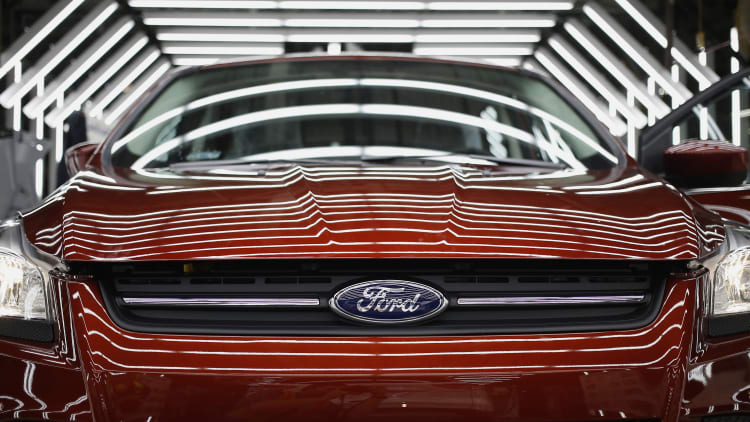
Ford's first-quarter profits plunged amid higher costs for product recalls and commodities and lower sales, but the automaker was able to outpace Wall Street's estimates and it continues to back its 2017 forecast for pretax profit.
Here's what the company reported versus what the Street was expecting:
- EPS: 39 cents, versus 35 cents expected by Thomson One analysts' consensus.
- Revenue: $39 billion, versus $34.7 billion expected by Thomson One.
Shares were up around 2 percent in pre-market trading.
Results were driven primarily by sales in North America, though Europe and Asia Pacific regions were also profitable.
A favorable mix of more profitable trucks and SUVs drove a 4 percent increase in revenue. In the U.S., Ford's average transaction price rose $1,971 over the first quarter of 2016, driven by sales of the F-150, Super Duty trucks, and Lincoln vehicles. The industry as a whole saw a transaction price increase of $506.
Net income fell 35 percent from the same quarter last year. Adjusted pretax profits fell more than 40 percent to $2.2 billion.
The company had to spend $295 million on two safety recalls, one for engine fire risk, and another for faulty door latches.
The company attributed lower year-over-year profits in part to
After two years of strong demand in North America, auto sales for the entire industry have begun to level off, and Ford (as well as competitors) have been making investments in new technologies, such as connectivity, autonomy and driver assistance, and alternative fuels.
In February for example, Ford announced it would invest $1 billion over the next five years to take a majority stake in Argo AI, an autonomous driving startup headed by former employees of Google and Uber.
Executives still continue to expect North America operating margin and profit lower than 2016, due in part to higher commodities costs and increased investments in emerging opportunities.
Ford said it still expects adjusted pretax profit to be about $9 billion in 2017. Full-year cost efficiencies of about $3 billion are expected to offset costs outside of investments in emerging opportunities, the company said in its shareholder letter.
The company will release a new version of its F-150 truck later this year, as well as a new Ford Expedition SUV, and a new Lincoln Navigator.


